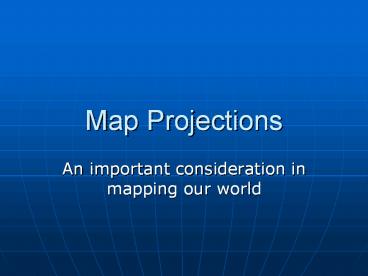Map Projections - PowerPoint PPT Presentation
1 / 21
Title: Map Projections
1
Map Projections
- An important consideration in mapping our world
2
Issues and Limitations
- Map projections are attempts to portray the
surface of the earth or a portion of the earth on
a flat surface. - Some distortions of different types always result
from this process. - Some projections minimize distortions in some of
these properties at the expense of maximizing
errors in others. - Some projections are attempts to only moderately
distort all of these properties.
3
Distortion Types
- Conformality
- When the scale of a map at any point is the same
in any direction, the projection is conformal.
Meridians (lines of longitude) and parallels
(lines of latitude) intersect at right angles.
Shape is preserved locally. - Distance
- A map is equidistant when it portrays accurate
distances from the center of the projection to
any other place on the map. - Direction
- A map preserves direction when azimuths (angles
from a point on a line to another point) are
portrayed correctly in all directions. - Scale
- Scale is the relationship between a distance
portrayed on a map and the same distance on the
Earth. - Area
- When a map portrays areas over the entire map so
that all mapped areas have the same proportional
relationship to the areas on the Earth that they
represent, the map is an equal-area map.
4
Distortions
5
Map projections fall into four general classes
- Cylindrical projections result from projecting a
spherical surface onto a cylinder. - Conic projections result from projecting a
spherical surface onto a cone. - Azimuthal projections result from projecting a
spherical surface onto a plane. - Miscellaneous projections include unprojected
ones such as rectangular latitude and longitude
grids and other examples of that do not fall into
the cylindrical, conic, or azimuthal categories
6
Cylindrical
- When the cylinder is tangent to the sphere
contact is along a great circle (the circle
formed on the surface of the Earth by a plane
passing through the center of the Earth)..
7
(No Transcript)
8
Conic projections
- When the cone is tangent to the sphere contact is
along a small circle. - In the secant case, the cone touches the sphere
along two lines, one a great circle, the other a
small circle.
9
(No Transcript)
10
Azimuthal projections
- When the plane is tangent to the sphere contact
is at a single point on the surface of the Earth.
- In the secant case, the plane touches the sphere
along a small circle if the plane does not pass
through the center of the earth, when it will
touch along a great circle.
11
Azimuthal equidistant projections are sometimes
used to show air-route distances. Distances
measured from the center are true. Distortion of
other properties increases away from the center
point.
12
(No Transcript)
13
The Mercator projection has straight meridians
and parallels that intersect at right angles.
Scale is true at the equator or at two standard
parallels equidistant from the equator. The
projection is often used for marine navigation
because all straight lines on the map are lines
of constant azimuth.
14
Transverse Mercator
- Transverse Mercator projections result from
projecting the sphere onto a cylinder tangent to
a central meridian. - Transverse Mercator maps are often used to
portray areas with larger north-south than
east-west extent. - Distortion of scale, distance, direction and area
increase away from the central meridian.
15
UTM
- The Universal Transverse Mercator (UTM)
projection is used to define horizontal,
positions world-wide by dividing the surface of
the Earth into 6 degree zones, each mapped by the
Transverse Mercator projection with a central
meridian in the center of the zone. - UTM zone numbers designate 6 degree longitudinal
strips extending from 80 degrees South latitude
to 84 degrees North latitude. - UTM zone characters designate 8 degree zones
extending north and south from the equator.
16
(No Transcript)
17
(No Transcript)
18
Unprojected Maps
- Unprojected maps include those that are formed by
considering longitude and latitude as a simple
rectangular coordinate system. Scale, distance,
area, and shape are all distorted with the
distortion increasing toward the poles.
19
(No Transcript)
20
References
- Peter H. Dana (1999) Map Projection Overview.
http//www.colorado.edu/geography/gcraft/notes/map
proj/mapproj.html - Hans Havlicek (2003) Picture Gallery of Map
Projections http//www.geometrie.tuwien.ac.at/kar
to/
21
(No Transcript)































